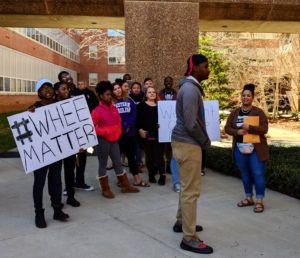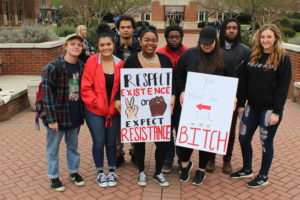Co-written with Keegan Wiggins
Western Carolina University prides itself on being a diversified and inclusive institution, but that identity has been shaken after the racial incidents that happened since the beginning of the spring semester.
Since the Whee Matter movement’s start in February, the administration has provided the student leaders and community with monthly reports of what they are doing to ensure the expectations are met.
“There have been at least four reports given out to students with updates. Here’s what you asked, here’s what we are doing, this is why we didn’t meet your deadline because the process takes longer,” said WCU Chief Diversity Officer Ricardo Nazario-Colón.
Among the set of initiatives by the administration to help resolve issues on campus is the enhancement of communication with students, faculty and staff.

Antonio Oakley leading a group of students to protest at the ground-breaking ceremony. Photo by Brannon Mahaley. March 2, 2018.
By doing so, the administration proposed to create a better bias reporting method. The bias reporting system can be found on the dean of students website under complaints and concerns. When an individual witnesses an event related to bias, he or she can report it using the system.
Typically, the dean of students, Kevin Koett will receive and review the report. If action is further warranted, Koett or the police will conduct an investigation.
The administration has decided it would be a good idea to also add the statistics on their bias reporting. They are doing this as a monthly report showcasing the type of incident, the number of incidents and whether it has been completed or still under investigation. So far, they have only completed three reports with the most recent being in March.
WCU’s administration will continue working on making the university a more diverse, inclusive and less discriminatory place, but we want to give an opportunity and platform to various groups on campus to talk about their experiences with discrimination on the campus and life.
These actions by the administration are not only a response to students’ desires following the Whee Matter forum, but also to the racial incidents that have occurred on campus this semester.
During the annual MLK Unity March on Jan.15, instead of unity among the students, particular individuals decided to use racial slurs directed to those marching.
This initial use of a racial slur led to another on Feb. 17 in which some students shouted the n-word from a window at Harrill Residence Hall toward the president of the Black Student Union and members of the Inspirational Gospel Choir.
“The n-word is a very loaded word,” said Nazario-Colón. “There is really some horrific history behind that word, and while it may be in popular culture in some variation, when individuals use it with the intention of making you feel less than and bad about who you are, reminding you of your history in this nation and the role you had in this nation, whether we’ve made progress or not, that intent comes all the way back with its history. It’s not just an innocent word.”
Only a few days later, on Feb. 20, an open forum, also known as the Whee Matter Forum, was held in the UC Grand Room for students to express what they feel should be done about the issues with race and diversity to upper administration. A list of student expectations was given for administration to complete by a certain deadline. This forum became the spark for what is known as the Whee Matter movement at WCU.
Keeping its momentum going, Whee Matter made sure its voice was heard through protest during the groundbreaking for the new Tom Apodaca Science Building on March 2. In attendance were the acting chancellor, members of the Board of Directors, along with UNC system president Margaret Spellings. Student leaders Antonio Oakley and Tenae Turner led this protest to demonstrate the importance of the needed change.
To show signs of solidarity with the students, members of the faculty and staff marched side by side with members of Whee Matter and other underrepresented minorities at WCU in the March for Equity on March 27. Amy Murphy-Nugen, a Faculty Senate member, was one of the individuals standing with them in opposition to racism and bigotry.
In response to the racial incidents this semester, Nazario-Colón offers students this word of advice.
“Don’t fear what you don’t know,” said Nazario-Colón. “Give yourself the opportunity to learn more about the world you live in. Don’t let the world you live in be a small little corner of your experience.”
As a result of this spark, we wanted to provide students from minorities with a platform to share their stories of discrimination both on and off campus.
To do so, we have created a four episode podcast series that looks at SAGA, LASO, ICA and international students.
We recognize that there are more minorities and organizations on campus that we could’ve included, but due to time, we narrowed it down to these four because of how vocal they have been at these events and on campus.
Follow the links below to listen to our episodes:



